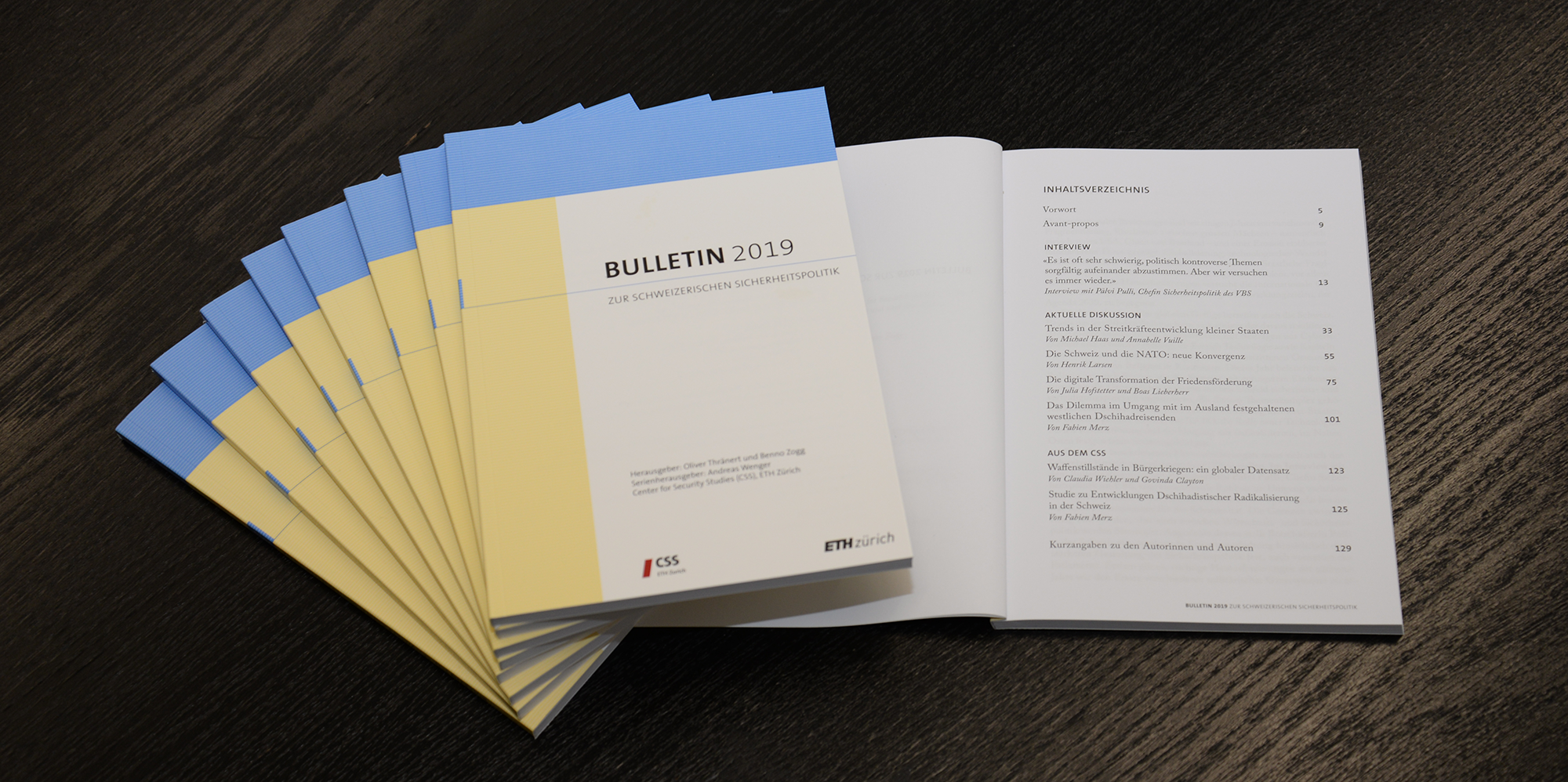Bulletin on Swiss Security Policy
The CSS’ newly released Bulletin 2019 on Swiss Security Policy features an interview with Ambassador Pälvi Pulli, head of security policy at the Federal Department of Defence, Civil Protection and Sport (DDPS), along with articles on the development of armed forces in small states, Switzerland and NATO, the digital transformation of peace promotion, and the dilemma in dealing with Western foreign fighters detained in Syria and Iraq.

Interview
"It is often very difficult to carefully coordinate politically controversial issues. But we keep trying."
The Bulletin 2019 begins with an interview with Ambassador Pälvi Pulli, head of security policy at the Federal Department of Defence, Civil Protection and Sport (DDPS). According to Ambassador Pulli, major powers are increasingly challenging the international system’s established rules and norms. This has consequences for Switzerland. The boundaries between war and peace as well as between economic and security policy are becoming more fluid. In view of this, Ambassador Pulli notes a growing expectation in Switzerland for security policy to play a stronger role, including on the part of Parliament. Swiss security policy is also confronted with the challenge of having to replace various large-scale military systems.
Discussion
Trends in the Development of Armed Forces in Small States
According to Michael Haas and Annabelle Vuille, many small states face considerable challenges when deciding on the future orientation and composition of their defense forces. The geostrategic environment is becoming increasingly volatile and harder to predict, defense technology is rapidly changing, and financial leeway in defense expenditures is still limited. This renders the development of a coherent strategy, doctrine and planning ever more difficult. How should small states strengthen their deterrence and defense capabilities? What role can technology play in this respect? The authors argue that the array of existing approaches in small states demonstrates that possibilities and instruments to respond are more diverse than it may first seem.
Download Switzerland and NATO: A New Convergence (PDF, 178 KB)
NATO-Swiss relations have historically oscillated between convergence and divergence, argues Henrik Larsen in his contribution for the Bulletin 2019. Switzerland made efforts to promote norms through the Partnership for Peace until the end of the 2000s. NATO, in view of the Afghanistan mission, subsequently became interested in partners of operational value and, after 2014, for collective defence. The challenges of the digital age provide the prospect of a re-convergence of Swiss-NATO interests. According to Larsen, Bern should seize upon the opportunity to orient its partnership with NATO (back) towards international norms, which are also at the core of Switzerland’s own foreign policy.
The Digital Transformation of Peace Promotion
Julia Hofstetter and Boas Lieberherr argue in their contribution to the Bulletin 2019 that new technologies offer great innovation potential for peacebuilding. At the same time, the application of these technologies represents a challenge for many actors. In order to fully exploit the potential, peace actors must play a more active role in the development and integration of such technologies. According to the authors, this requires a deeper exploration of the relationship between technology and its socio-political context as well as new structures and platforms. Further, particularly when it comes to the latter, Switzerland can make an important contribution as an established peace actor and technology hub.
The Dilemma in Dealing with Western Foreign Fighters Detained in Syria and Iraq
With the shattering of the “Islamic State” (IS) as a territorial entity, a large number of Western IS foreign fighters and their families have been detained in Syria and Iraq. These include Swiss citizens. How should these people be treated? According to Fabien Merz, the various options on how to deal with them come with important challenges and security implications. Turkey’s military offensive in northeast Syria additionally complicates this situation.
CSS Projects
Ceasefires in Civil Wars: A Global Data Set
Govinda Clayton and Claudia Wiehler contend that though ceasefires accompany most peace deals in civil wars, we know remarkably little about them. For this reason, the CSS has launched a project to create a comprehensive database on ceasefires. This database will serve as a basis for country reports focusing on ceasefires and the peace processes that come with them.
Study on the Developments in Jihadist Radicalization in Switzerland
Under the guidance of Miryam Eser Davolio, Zürcher Hochschule für Angewandte Wissenschaften (ZHAW), Fabien Merz participated in the report “Updated Review and Developments in Jihadist Radicalisation in Switzerland – Updated Version of an Exploratory Study on Prevention and Intervention”. Among other things, the study shows challenges and approaches in the penal system, in the area of prevention and in the rehabilitation of radicalized persons.